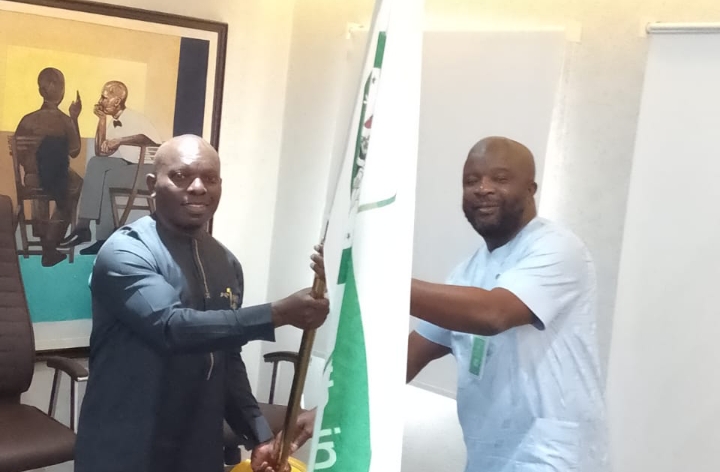Ahead of the 2027 general election a non- partisans organization under the auspices of Youth in Parliament Forum (YIPF) said its targeting 40% youth representation in all elective positions in the country.
The Director General of YIPF, Hon. Tony Nwulu stated this on Tuesday in Abuja while receiving the Managing Director Prezzo Shed Investments Limited, Dr. Emmanuel Njoku.
Tony Nwulu said the forum has evolved into what many now refer to as Nigeria’s first youth-centered parliamentary coordination hub.
He said no fewer than 1.2 million young Nigerians have shown interest to run for public office in the 2027 general elections under the guidance of the forum.
The YIPF is an initiative pushing for greater youth inclusion in governance. It operates at the intersection of national and sub-national policymaking, with a vision to place competent youth in strategic legislative and executive positions.
He said “This forum was born out of the need to create a structured and results-oriented platform for young Nigerians.
“We saw the agitations, the social media campaigns, the disillusionment, and we decided it was time to move from complaining to actual participation.”
He said, “For the first time in our political history, we are seeing 30- to 35-year-olds chairing national boards and agencies,” Nwulu stated. “This is a shift, and it deserves recognition.”
Among YIPF’s flagship initiatives is the Take Action Campaign, a civic mobilization and political education programme targeted at galvanizing Nigerian youth to not just vote, but to run for office.
The forum stated during a presentation of its Take Action Campaign that, “The challenge isn’t just youth apathy — it’s also poor preparation. Through this campaign, we’re ensuring that young aspirants understand what leadership requires before stepping into it.”
The forum highlighted a rigorous three-stage entry process for youth aspirants. First, participants must register via YIPF’s online portal. Second, they are enrolled in a comprehensive leadership development module, designed in collaboration with institutions. Finally, candidates face a panel interview, assessed by policy experts, legal practitioners, and veteran lawmakers.
Nwulu explained that, “We are deliberately building a crop of youth leaders who are grounded in democratic values, public policy, innovation, and accountability. This is how we break the cycle of accidental leadership.”
In recognition of the numerous barriers young candidates face — from legal battles to financial constraints — YIPF has secured critical partnerships to support their journey.
“One of our proudest moments came when the Nigerian Bar Association (NBA) agreed to provide pro bono legal services to youth candidates,” Hon. Nwulu disclosed. “Legal obstacles have shut down many dreams, and we’re removing that bottleneck.”
He added that several media organizations have also partnered with YIPF to offer visibility campaigns for emerging youth candidates ahead of 2027. “We must amplify these new voices,” Nwulu said. “Visibility is political currency.”
Perhaps the most ambitious of YIPF’s targets is its call for 40% youth representation across the National Assembly and State Houses of Assembly by 2027. “This is not a wish — it’s a strategic goal backed by data and planning,” Nwulu said.
“We already have young people in office, such as Hon. Ararachi Amadi Hon. Akarachi (Mbaitoli/Ikeduru Federal Constituency) from Imo State, who entered the House of Representatives at age 26. We want more.”
The forum also noted that its legislative committee is now formally recognized in the House of Representatives, and the structure is being mirrored in state assemblies across all 36 states.
“This platform has given us access,” said Hon. Nwulu, revealing that Hon. Olamijuwonlo Alao-Akala (North, South and Oriire) chairs the House Committee on YIPF at the House of Representatives.
“Now, when we propose youth-centered policies here in Abuja, they can be quickly cascaded to state legislatures through our speaker’s network,” he said.
He added, “We’ve come a long way in a short time. We’re no longer just asking for a seat at the table — we’re building the table, designing the agenda, and selecting who sits where.”



